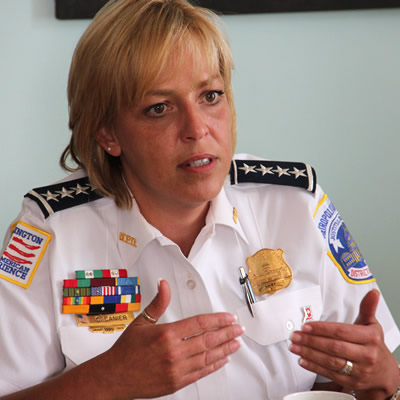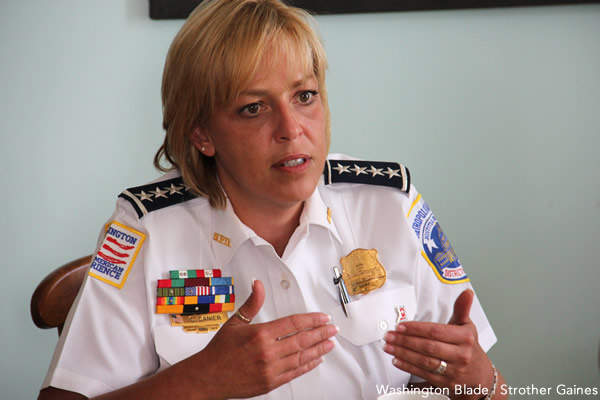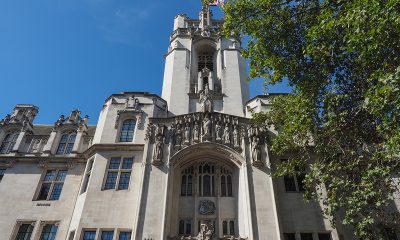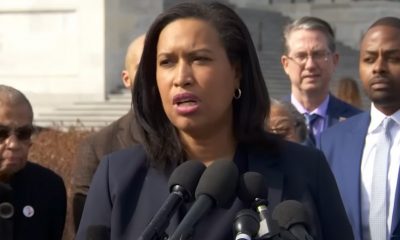Local
Report critical of D.C. police response to hate crimes
Gay liaison unit’s ability to fight hate crimes ‘weakened’ by changes


D.C. Police Chief Cathy Lanier (Washington Blade photo by Strother Gaines)
The restructuring of the D.C. Metropolitan Police Department’s Gay and Lesbian Liaison Unit in 2009 “weakened its effectiveness in responding to hate crimes” and hindered its ability to reach out to the LGBT community, according to a newly released report.
The 41-page Hate Crimes Assessment Report was prepared by an independent task force created in 2012 by the Anti-Defamation League of Washington, a nationally recognized civil rights group, at the request of D.C. Police Chief Cathy Lanier.
In announcing the launching of the task force, Lanier said she asked the ADL to assist the MPD by conducting an impartial review of its programs directed toward the LGBT community, comparing them with other police departments and identifying areas that could be improved.
“MPD policies on the identification and handling of bias or hate crimes are strong and reflect many best practices of law enforcement agencies nationally,” the report concludes.
It also concludes that the “vast majority” of MPD leaders and rank and file officers have a deep commitment to “ensuring the safety and security of the LGBT community and to all of those who live, work, or visit the District of Columbia.”
But the report says a series of structural changes that the department put in place for the GLLU beginning in 2009, which were aimed at expanding the reach of the unit throughout the city, appear to have weakened its effectiveness and diminished its credibility within the LGBT community.
“MPD’s outreach to the LGBT community, which is a critical component of preventing and responding to hate crimes, is significantly less visible and effective than it was prior to the restructuring,” the report says.
“The restructuring of the GLLU reduced the size and limited the role of the central core of the GLLU, weakened its effectiveness in responding to hate crimes and engaging in outreach, and made it less accessible and visible to the LGBT community,” says the report.
“The GLLU’s reduced visibility and presence in the LGBT community has significantly impacted the level of trust the LGBT community has in MPD,” it says.
Former Police Chief Charles Ramsey created the GLLU along with separate liaison units working with the Latino, Asian, and deaf and hard of hearing communities in the late 1990s. Unlike police liaison units in other cities, whose responsibilities were limited mostly to public relations and educational duties, Ramsey arranged for the GLLU and the other units to investigate crimes and make arrests.
Under the leadership of its former commander, Sgt. Brett Parson, the GLLU developed strong ties to the LGBT community, assigning its officers to attend LGBT events and meetings and to patrol neighborhoods with high concentrations of LGBT residents. Although the officers were based in the GLLU headquarters in Dupont Circle, they responded to calls throughout the city and played an active role in investigating crimes targeting LGBT people, including hate crimes.
Harvard University’s Kennedy School of Government recognized the GLLU as a highly effective agent for community policing and awarded the unit a grant to expand its work and assist police departments in other cities set up similar units.
In 2009, two years after then Mayor Adrian Fenty appointed her, Lanier put in place a restructuring plan that, among other things, decentralized the GLLU and the other liaison units through the creation of an affiliate officers program that placed affiliate liaison unit members in each of the seven police districts. The restructuring included downsizing the central GLLU office.
LGBT activists, who said they had no objections to the creation of the affiliate program, expressed strong opposition to what they said was an initial plan by Lanier to close the GLLU’s headquarters office. Activists said at the time that the affiliate officers, who were to receive limited training on LGBT related issues, would not have the experience and depth of understanding of the LGBT community that the core GLLU officers, most of whom were gay or lesbian, had.
Lanier quickly backed down from her initial plan to disband the headquarters unit after opposition surfaced from members of the City Council. However, according to activists, she appeared to be gradually decreasing the core unit’s size.
A short time after the restructuring began, Parson requested and was given a transfer out of the unit to patrol duties. Citing budget constraints, the department replaced Parson with a sergeant who was assigned to supervise both the GLLU and the Latino Liaison Unit.
LGBT representatives said the lack of a full-time supervisor for the GLLU was a further indication that the chief was diminishing the ability of the GLLU to carry out its mission.
Other changes associated with the restructuring included restrictions on the types of events or meetings GLLU officers could attend and what appeared to critics as an increase in the frequency that GLLU officers were detailed to other assignments unrelated to the LGBT community.
Lanier has said that due to police personnel limitations, officers from various specialized units would be temporarily detailed to other, street patrol duties as needed.
In a series of recommendations, the Hate Crimes Assessment Report calls on the department to appoint a full-time supervisor of the GLLU and to ensure that the GLLU’s core unit is sufficiently staffed with officers.
In an 8-page response to the task force report, Lanier said she and the department’s leadership agree with most of the conclusions and recommendations of the report.
“Admittedly, some of this is difficult for me to read as it clearly details where the Department has fallen short in our goal to foster strong relationships with our great and diverse communities that enable us to jointly combat the scourge of crimes motivated by hate or bias,” Lanier said in a statement accompanying the report.
“Nonetheless, I strongly support the recommendations of the Task Force, and the Department will be working to implement them,” she said.
Among other things, Lanier said the department agrees with the report’s finding that neither the GLLU nor its affiliate officers “have the visibility in the community that is our goal, and we must improve that.”
She added, however, that it became clear from the report and meetings MPD officials had with the task force that some members of the LGBT community have “expectations” that the MPD cannot meet.
“While we value a strong relationship with the LGBT community, we are also responsible for being sound stewards of public resources,” she said in her response. “Members of the GLLU had attended events in the past that we have determined are inappropriate for police officers on-duty, including bar crawls, book clubs, and certain events in Leather Week,” according to Lanier.
“That said, we believe there are plenty of opportunities for MPD – GLLU as well as its affiliates – to strengthen outreach with the community,” she said.
In her response to the report, Lanier said Sgt. Matthew Mahl, who had been detailed to serve as the GLLU’s supervisor for over a year, “has been assigned to oversee GLLU exclusively since November 2013.” She added that Mahl “is a good fit for the GLLU and its next stage of development.”
In another finding, the report says there is a belief in the LGBT community that “homophobia and transphobia are widespread within MPD, with several describing it as rampant.”
Interviews with members of the community revealed that the hostility toward transgender people, especially transgender women of color, is common among many MPD officers, the report says.
“Virtually every transgender person who spoke to us at the four community meetings reported that they had been harassed or mistreated because of their gender identity or expression, ranging from acts of ignorance and insensitivity to outright hostility and overt expressions of bigotry and harassment,” the report says.
In citing hate crimes data released by the MPD, the report notes that hate crimes targeting the LGBT community make up the highest percentage of hate crimes compared to other categories of victims, such as race, ethnicity, religion, or disability. In 2012, the most recently year for which full data is available, there were 46 reported hate crimes based on sexual orientation, comprising 57 percent of a total of 81 hate crimes for all categories.
Police data show there were 9 hate crimes reported in 2012 based on gender identity or expression.
The report doesn’t say how many cases of anti-LGBT hate crimes resulted in an arrest by police or how many of the cases remain unsolved.
“It remains unclear whether the reported increase [in anti-LGBT hate crimes] reflects an actual higher level of hate violence directed against the LGBT community, better reporting by LGBT victims, or the lack of reporting by victims in other categories,” the report says.
The task force members who wrote the report are: David Friedman, Sophie Dornstreich, Michael Liberman – Anti-Defamation League; Sara Warbelow – Human Rights Campaign; Lisa Bornstein – Leadership Conference on Civil and Human Rights; Mara Keisling and Vincent Paolo Villano – National Center for Transgender Equality; Jack McDevitt, Associate Dean and Director of the Institute of Race and Justice, Northeastern University in Boston; and Jim Nolan, Associate Professor of Sociology and Criminology, West Virginia University in Morgantown.
“We welcome the recommendations in the ADL report,” said Hassan Naveed, co-chair of Gays and Lesbians Opposing Violence (GLOV). “GLOV and other LGBT organizations plan to issue a community response to the recommendations in the next two weeks.”
The full report along with Lanier’s response can be seen here: http://mpdc.dc.gov/
District of Columbia
Two charged with assaulting, robbing gay man at D.C. CVS store
Incident occurred after suspects, victim ‘exchanged words’ at bar

D.C. police just after 1 a.m. on April 10 arrested two men for allegedly assaulting and robbing a gay man inside a CVS store at 1418 P St., N.W., according to a police report and charging documents filed in D.C. Superior Court.
The charging documents state that the alleged assault and robbery occurred a short time after the three men “exchanged words” at the gay bar Number 9, which is located across the street from the CVS.
The arrested men are identified in the charging documents as Marquel Jose Diaz, 27, of Northwest D.C., and Lorenzo Jesse Scafidi, 21, of Elizabeth City, N.C. An affidavit in support of the arrest for Diaz says Diaz and the victim “were previously in a relationship for a year.”
Court records show Diaz was charged with Simple Assault, Theft Second Degree, and Possession of a Controlled Substance. The court records show the controlled substance charge was filed by police after Diaz was found to be in possession of a powdered substance that tested positive for cocaine.
Scafidi was charged with Simple Assault and Theft Second Degree, the court records show.
The D.C. police report for the incident does not list it as a suspected hate crime.
The court records show both men pleaded not guilty to the charges against them at a Superior Court arraignment on the day of their arrest on April 10. The records show they were released by a judge while awaiting trial with an order that they “stay away” from the victim. They are scheduled to return to court for a status hearing on May 21.
The separate police-filed affidavits in support of the arrests of both Diaz and Scafidi each state that the two men and the victim “exchanged words” inside the Number 9 bar. The two documents state that both men then entered the CVS store after the victim went to the store a short time earlier.
Scafidi “came into the CVS shortly after and entered the candy aisle and slammed Complainant 1 [the victim] to the ground causing Complainant 1’s phone to fall out of CP-1’s pocket,” one of the two affidavits says. It says Scafidi “again picked up CP-1 and slammed him to the ground.”
The affidavit in support of Diaz’s arrest says Diaz also followed the victim to the CVS store after words were exchanged at the bar. It says that after Scafidi allegedly knocked the victim down in the candy aisle Diaz picked up the victim’s phone, “swung on” the victim “while he was still on the ground,” and picked up the victim’s watch before he and Scafidi fled the scene.
Without saying why, the two arrest affidavits say Diaz and Scafidi returned to the scene and were arrested by police after the victim and at least one witness identified them as having assaulted and robbed the victim.
Attorneys representing the two arrested men did not respond to phone messages from the Washington Blade seeking comment and asking whether their clients dispute the allegations against them.
The victim also did not respond to attempts by the Blade to obtain a comment from him. The police report says the victim is a resident of Fairfax, Va.
District of Columbia
Bowser calls for ‘extraordinary’ response to reduction in D.C. budget
Impact on city funding for LGBTQ programs and grants unclear

D.C. Mayor Muriel Bowser on April 15 issued an executive order calling for “extraordinary actions,” including “significant cuts in District Government services,” to address a decision by Congress to cut the city’s current budget by $1.1 billion.
The nine-page executive order points out that these actions became necessary after the U.S. House of Representatives has so far declined to vote on a free-standing bill approved by the U.S. Senate last month that would restore the $1.1 billion D.C. budget cut initially approved by the House.
In addition to large-scale cuts in city services, the mayoral order says the congressionally imposed city budget cut will bring about city “hiring freezes, financial impacts to employees, reductions and terminations in contracts and grants, and closures of District Government facilities.”
The order adds, “These are unprecedented actions given that the District itself adopted and is able to implement a fully balanced budget, but they are necessary due to the Congressional cut to the District’s budget and its inaction in timely fixing its legislative error.”
The House adjourned this week on a recess until the end of April, and congressional observers say it is unclear whether the majority Republican House will take up the Senate bill to undo the D.C. budget cut when the House returns from its recess. President Donald Trump has called on the House to approve the bill to restore the full D.C. budget.
Among the D.C. LGBTQ organizations and those providing services to the LGBTQ community that receive D.C. government funding and that could be impacted by the budget cuts are Capital Pride Alliance, which is organizing WorldPride 2025 set to take place in D.C. next month; and Whitman-Walker Health, one of the city’s largest private healthcare organizations that provides medical services for LGBTQ clients.
Also receiving city funding are the Wanda Alston Foundation, which provides housing services for LGBTQ people; and the LGBTQ youth advocacy and services organization SMYAL.
Spokespersons for the four organizations couldn’t immediately be reached to determine if they knew whether the soon-to-be implemented budget cuts would have an impact on the city funding they currently receive.
In response to questions from news reporters during an April 15 press conference call to discuss the Bowser executive order, Jenny Reed, director of the D.C. Office of Budget and Performance Management, said details on specific programs or funding allocations set to be cut would not be known until the mayor submits to the D.C. Council her Supplemental FY 2025 budget along with her proposed FY 2026 budget.
Reed was joined at the press briefing by Lindsey Parker, Mayor Bowser’s chief of staff; and Tomas Talamante, director of the Office of Intergovernmental Affairs.
They and other city officials have said the impact of the congressionally imposed city budget cut was expected to be lessened but remain highly problematic by Bowser’s decision to invoke a 2009 law that allows the city to increase its own spending without approval by Congress under certain circumstances.
The mayor has said under that law, the city would need to cut its FY 2025 budget by $410 million rather than by $1.1 billion. It couldn’t immediately be determined whether House Republicans, who initiated the requirement that the D.C. budget be cut by $1.1 billion, would challenge the mayor’s plan to invoke the 2009 law to reduce the size of the budget cut.
“Without the ability to fully execute the Fiscal Year 2025 budget as adopted and approved by the District, this gap will force reductions in critical services provided by our largest agencies, including the Metropolitan Police Department and the Fire and Emergency Medical Services Department,” the mayor’s executive order states.
“The District will continue to work with members of the House of Representatives to urge them to vote to fully restore the District’s Fiscal year 2025 budget and will continue to work with President Trump to strongly encourage the House of Representatives to take that action,” the order says.
District of Columbia
LGBTQ budget advocates fight for D.C. resources in a tough fiscal year
‘Trying to preserve life-saving services’ amid $1 billion cut

The months and days leading up to June are especially busy for LGBTQ Washingtonians. For one group, the DC LGBT Budget Coalition, which works year-round to ensure LGBTQ residents are represented and financially supported by the D.C. government, this time of year is their Super Bowl. Beginning in April, the D.C. Council and Mayor’s Office hold budget hearings for the next fiscal year.
With D.C.’s budget now under review, the Washington Blade spoke with Heidi Ellis, coordinator of the DC LGBT Budget Coalition, about the group’s top priorities and their push to ensure continued support for queer communities.
“The LGBTQ Budget Coalition was founded in 2020 at the height of the pandemic, as a way for the community to work together to advocate for key funding and policy changes,” Ellis said. “We recognized we were stronger together. A lot of groups are often pitted against each other for resources and dollars. This coalition was founded out of a need for unity. Since then, we’ve successfully advocated for more than $20 million in dedicated LGBTQ investments.”
In addition to coordinating the coalition, Ellis is the founder and CEO of HME Consulting & Advocacy, a firm that helps build coalitions and advance policy initiatives that address intersectional issues in the LGBTQ community. One of its most powerful tools, she explained, is direct outreach through community surveys.
“We actually do community surveys to see what people need and what’s top of mind,” Ellis said. “Of course, we also pay attention to the broader political landscape — like the current threats to HIV funding. That helps us prioritize.”
Because the coalition is comprised of more than 20 organizations across various sectors —healthcare, housing, community organizing — Ellis said its diversity enables it to connect grassroots needs to potential policy solutions.
“Our coalition includes service providers, community groups, health and housing advocates-folks who are deeply plugged into what’s happening on the ground,” she said. “They help determine our direction. We know we don’t represent every queer person in D.C., but our coalition reflects a wide range of identities and experiences.”
The insights gathered through those surveys ultimately inform the coalition’s annual budget proposal, which is submitted to the Council and mayor.
“That’s how we got to our FY26 priorities,” she said. “This year, more than ever, we’re fighting to protect what we’ve already secured — funding and policies we’ve had to fight for in the past. We know there’s concern around this budget.”
One of the challenges this year is that the D.C. government’s operating budget and some of its legislation must be approved by Congress. With a projected decline in tax revenue and a Republican-controlled Congress that has historically opposed LGBTQ funding, the Coalition has had to think strategically.
“Even before the situation on the Hill, the CFO projected lower revenue,” Ellis said. “That meant cuts to social programs were already coming. And now, with the $1 billion slashed from D.C.’s budget due to the continuing resolution, we’re not only fighting for D.C.’s budget and autonomy, but also trying to preserve life-saving services. Our message is simple: Don’t forget about queer people.”
This year’s proposal doesn’t include specific dollar figures. Instead, the Coalition outlines five funding priority areas: Healthcare, Employment & Economic Equity, Housing, Safety & Community Support, and Civil Rights.
Why no exact amounts? Ellis said it’s because not all solutions are financial.
“Some of our asks don’t require new funding. Others build on existing programs-we’re asking whether the current use of funds is the most effective. We’re also proposing policy changes that wouldn’t cost extra but could make a real difference. It’s about using what we have better,” she said.
When drafting the proposal, the Coalition tries to prioritize those with the most pressing and intersecting needs.
“Our perspective is: If we advocate for the most vulnerable, others benefit too,” Ellis said. “Take LGBTQ seniors. Some may have done well in life but now face housing insecurity or struggle to access affordable healthcare. Many in our coalition are elders who fought on the frontlines during the AIDS epidemic. They bring critical historical context and remind us that Black and brown communities bore the brunt of that crisis.”
“I love our coalition because it keeps us accountable to the moment,” she added. “If we center those most marginalized, we can make an impact that lifts everyone.”
In addition to healthcare and housing, safety remains a top concern. The Coalition has fought to maintain funding for the Violence Prevention and Response Team (VPART), a city-supported group that includes MPD, community-based organizations, and the Mayor’s Office of LGBTQ Affairs. VPART responds to crimes affecting the LGBTQ community and connects victims to legal, healthcare, and housing services.
“We’ve pushed to make VPART more proactive, not just reactive,” Ellis said. “The funding we’ve secured has helped survivors get the support they need. Cutting that funding now would undo progress we’re just beginning to see.”
At the end of the day, Ellis emphasized that this process is about far more than spreadsheets.
“A budget is a moral document,” she said. “If we’re not represented, you’re telling us our lives don’t matter at a time when we need protection the most. When people can’t get food, medicine, housing — that has a devastating impact. These are vital services.”
The DC LGBT Budget Coalition is urging residents to support a letter-writing campaign to D.C. Council members and the mayor. You can send a letter here: https://actionnetwork.org/letters/fully-fund-dcs-lgbtq-communities
Read the full FY26 budget proposal here: https://drive.google.com/file/d/1bTrENnc4ZazJTO6LPrQ3lZkF02QNIIf1/view
-

 The White House5 days ago
The White House5 days agoWhite House does not ‘respond’ to reporters’ requests with pronouns included
-

 District of Columbia2 days ago
District of Columbia2 days agoReenactment of 1965 gay rights protest at White House set for April 17
-

 Hungary2 days ago
Hungary2 days agoHungarian MPs amend constitution to ban public LGBTQ events
-

 Maryland2 days ago
Maryland2 days agoFreeState Justice: Transgender activist ‘hijacked’ Moore’s Transgender Day of Visibility event









